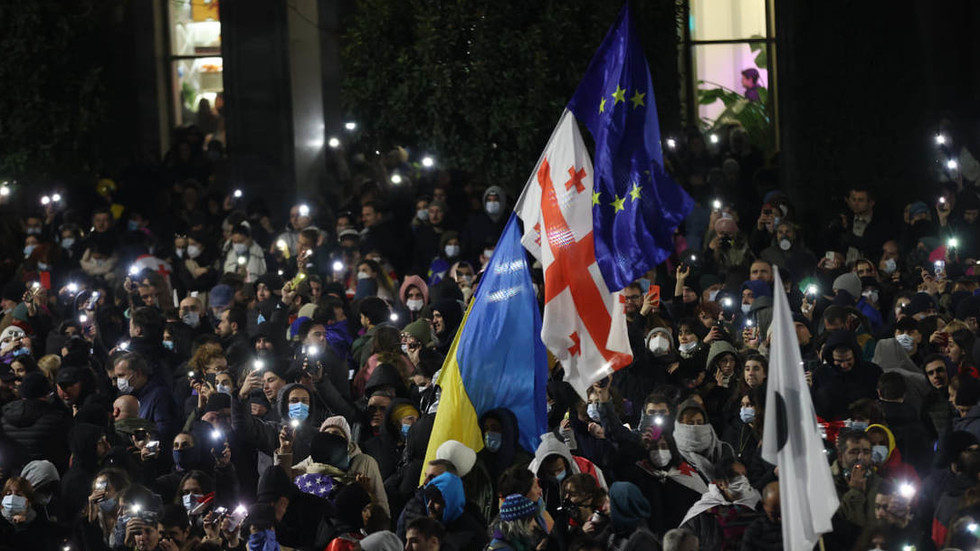The present situation in Georgia is reminiscent of historical uprisings but diverges significantly from past instances, particularly the 2003 Rose Revolution and the subsequent events in other former Soviet states. These ‘color revolutions,’ originally viewed as grassroots movements instigated by popular dissatisfaction with corrupt regimes, have evolved into complex phenomena that draw substantial external influence and interest. While Georgia currently witnesses another wave of protests led by the pro-Western opposition, the dynamics of the situation differ considerably from previous years. The ruling party, Georgian Dream, finds itself locked in a challenging standoff with Western powers, especially the United States and the European Union, amid growing frustrations over its perceived deviations from pro-European policies.
Bidzina Ivanishvili, the founder of Georgian Dream, bases his political strategy on a triad of calculations. Firstly, he believes that the geopolitical landscape has shifted; Western leaders are preoccupied with more pressing global issues and are unlikely to expend significant resources to support Georgia, unlike during earlier revolutions. The second factor is the current stability and economic growth within Georgia, creating a preference among the populace for continuity over potential disruptions linked to external influences. Finally, Ivanishvili is cautious about the aftermath of any regime change, pointing to the chaotic experiences of neighboring countries that succumbed to external pressures leading to their governments’ collapse. This rationale underpins the Georgian government’s resistance to Western commands, positioning itself as a bulwark against what is seen as destabilizing external influence.
However, the calculations of Tbilisi’s leadership may not reflect the full scope of the situation. The current geopolitical climate, strained by the ongoing conflict in Ukraine and shifting political dynamics in the U.S., increases the significance of events in Georgia, transforming it into a crucial battleground for Western interests. The government’s recent decision to halt European Union accession talks signals a bold stance, which challenges the EU’s traditional influence and prestige regarding its applicant states. In light of the EU’s commitment to promoting democracy and integration within its neighborhood, any setback—such as Georgia’s withdrawal—poses a threat to its credibility and is viewed as a substantial policy failure.
Public sentiment within Georgia remains divided regarding the government’s approach to European integration. While some citizens resonate with Georgian Dream’s stance against perceived Western imposition, a significant portion of the populace continues to advocate for a clearer, more strategic path toward EU membership. For the opposition, this disparity offers fertile ground to rally discontent and mobilize protests. The true challenge for both factions lies in managing the delicate balance of power without provoking violence. Given that previous color revolutions often intensified tensions to frame the ruling government as authoritarian, the current scenario invites the potential for similar outcomes if the opposition can capitalize on public frustrations effectively.
Amidst this friction, the aspirations for a ‘European future’ remain deeply embedded within Georgian society, enjoying widespread support even among Georgian Dream’s ranks. The ruling party claims allegiance to European integration goals but emphasizes a tailored approach to achieving them, which places it at odds with the opposition’s more unilateral accusations that the government is stalling reform. The stakes are high; many fear that continued governmental resistance to the European agenda could lead Georgia back to Russian influence—a narrative the opposition is keen to amplify.
The concept of a color revolution is gradually transforming, from a narrative of democratic change to a tool for geopolitical maneuvering. As the once-ubiquitous Western approach to promoting democracy faces heightened scrutiny in the face of global shifts, the future effectiveness of such movements in undermining governments is uncertain. The evolving global order signifies diminishing Western supremacy, creating a more competitive environment for nations like Georgia. Hence, whether the country can withstand external pressures while preserving its sovereignty and navigating a new geopolitical landscape is a question that resonates far beyond its borders, marking the onset of a critical juncture in its history.

